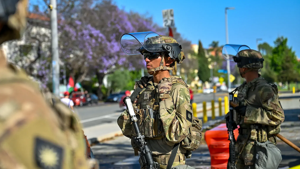A federal judge Tuesday ruled against President Donald Trump’s deployment of the California National Guard and Marines in Los Angeles.
U.S. District Court Judge Charles Breyer determined Trump violated the Posse Comitatus Act and ruled the president can’t use the military for law enforcement.
The San Francisco judge delayed the decision from taking effect until noon Sept. 12, which gives the Trump administration time to appeal.
“Congress spoke clearly in 1878 when it passed the Posse Comitatus Act, prohibiting the use of the U.S. military to execute domestic law,” Breyer wrote in his 52-page decision for the U.S. District Court for the Northern District of California.
Breyer ruled the Trump administration is not allowed to deploy, order, instruct, train or use the National Guard or any other military troops to enforce laws.
That includes, but is not limited to, “engaging in arrests, apprehensions, searches, seizures, security patrols, traffic control, crowd control, riot control, evidence collection, interrogation, or acting as informants,” the judge said as he granted injunctive relief.
The case was brought by California Gov. Gavin Newsom against Trump, Defense Secretary Pete Hegseth and the Department of Defense.
“The evidence at trial established that Defendants systematically used armed soldiers (whose identity was often obscured by protective armor) and military vehicles to set up protective perimeters and traffic blockades, engage in crowd control, and otherwise demonstrate a military presence in and around Los Angeles,” Breyer wrote. “In short, Defendants violated the Posse Comitatus Act.”
While there were protests in June in Los Angeles against immigration arrests and some violence, there was no rebellion against the U.S., Breyer said. He added civilian law enforcement was able to respond to protests.
The ruling doesn’t mean Trump must withdraw the 300 National Guard troops who are being deployed through November in Los Angeles, but the federal deployment must be consistent with the Posse Comitatus Act, Breyer said.
The military may continue to guard federal buildings in Los Angeles, he said.
The judge also noted his ruling applies only to California and not the entire nation.
California Attorney General Rob Bonta welcomed Breyer’s ruling in a video and news release.
“Today’s ruling affirms that President Trump is not King, and the power of the executive is not boundless,” Bonta said. “For more than two months, the president has engaged in political theater, using National Guard troops and Marines as pawns to further his anti-immigrant agenda. In doing so, he trampled on one of the very basic foundations of our democracy: That our military be apolitical and the activities of troops on U.S. soil be extremely limited to ensure civil liberties and protect against military overreach.”
The White House criticized Breyer’s ruling.
“Once again, a rogue judge is trying to usurp the authority of the Commander-in-Chief to protect American cities from violence and destruction,” White House spokesperson Anna Kelly said in a statement.
The Posse Comitatus Act, meanwhile, allows Congress to pass laws to use military in case of domestic violence, protection of federal property and enforcement of some federal laws and court orders, according to an abstract on a 1987 Journal of Criminal Justice article. The U.S. Department of Justice published the abstract on its website, ojp.gov.
In his ruling, Breyer said he was rejecting the Trump administration’s argument that an injunction against the Trump administration doesn’t apply because the remaining 300 National Guard troops are a much smaller number than 4,000 deployed after the June protests and riots. Breyer said the 300 troops were “improperly trained as to what activities they can and cannot engage in under the Posse Comitatus Act.”
“Further, President Trump’s recent executive orders and public statements regarding the National Guard raise serious concerns as to whether he intends to order troops to violate the Posse Comitatus Act elsewhere in California,” said Breyer, who was appointed by former President Joe Biden and is the younger brother of retired liberal U.S. Supreme Court Justice Stephen Breyer.
In his ruling, Breyer quoted Trump discussing the possible deployment of the National Guard in Chicago: “I have the right to do anything I want to do. I’m the President of the United States. If I think our country is in danger, and it is in danger in these cities, I can do it.”






